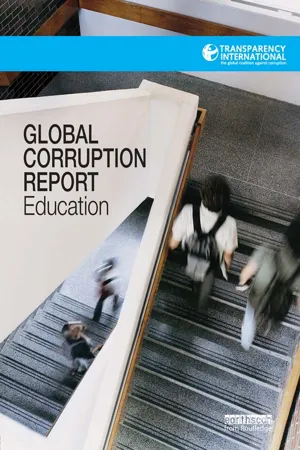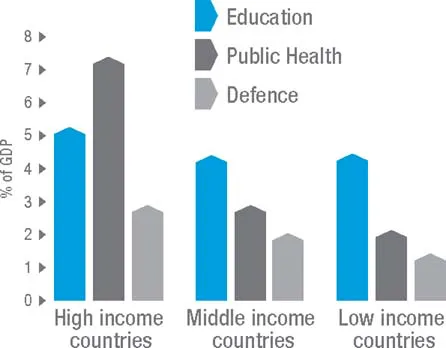![]()
PART 1
Framing corruption in education – global trends
![]()
Introduction to the Global Corruption Report: Education
Transparency International
Education is a fundamental human right and a major driver of personal and social development. All around the globe it is seen as the key to a better future, providing the tools that people need to sustain their livelihoods, live with dignity and contribute to society.
When access to education or its quality suffers, the potential of individuals, communities and nations is squandered. Corruption in the education sector is a key reason why such waste occurs. Despite increased international and domestic investment in education over the past two decades, corruption and poor governance prevent the returns to this investment from reaching many of its intended beneficiaries. Corruption in education is among the most significant barriers to reaching the Millennium Development Goals (MDGs) and realising the universal right to education.
Corruption not only distorts access to education but also affects the quality of education and the reliability of academic research findings. Corruption risks can be found at every level of education and research systems, from the procurement of school resources to nepotism in the hiring of teachers or the skewing of research results for personal gain. Conversely, education serves as a means to strengthen personal integrity, and is essential for addressing corruption effectively.
Schools and institutions of higher education are important settings in which young people develop values related to social relations and personal citizenship. Students learn not just from the content of instruction but also from the ‘hidden curriculum’ – which includes implicit rules that determine who advances and who does not.1 When these rules are not characterised by integrity, young people internalise corrupt views of what it takes to succeed in society.2 The hidden nature of a corrupt ‘curriculum’ may provide some explanation as to why education is rarely seen as a highly corrupt sector. Children and youth rarely have the ability to question the rules of the classroom or comment on conflicts between what is espoused and what is implicit.
Whether expectations of what is required for success are developed consciously or not, they accompany people out of school and into society.3 When these expectations involve corruption, the rules learned by young people are likely to extend from education into every other sector of society that they subsequently enter. Conversely, however, educational institutions also have the potential to play a critical role in promoting integrity and teaching an anti-corruption stance. This report brings together the expertise of the anti-corruption movement to examine the underlying factors affecting corruption in the education sector, and showcases significant work to improve governance and educational outcomes around the world.
Roots of corruption in education
Despite its fundamental values of fairness and impartiality, education is seen by some as especially vulnerable to corruption.4 Corruption risks are elevated by two main factors: the high stakes of educational opportunity and the large sums allocated to fund it.
The first cause of corruption risks in education is the high stakes involved. Education is universally valued as a formative condition of human and national development. Parents and governments recognise that the outcomes of schooling determine the futures of individuals and nations alike. Formal education is a widely accepted mechanism for selecting people for appropriate roles in society, and its absence or inadequacy deprives young people of the basic tools needed to achieve prosperity, prestige and authority.5 Because of the perceived high stakes of education, it is an attractive target for political manipulation.6
Multiple international bodies have recognised education as a moral imperative and an inalienable human right, but in some parts of the world it remains a scarce and limited good. Even when access to education is guaranteed, its quality varies significantly, and it can be bought and sold in ways both legitimate and illegitimate. The high stakes of educational opportunity give those who provide educational services a strong position to extort favours or funds. At each educational level there are multiple ‘gatekeepers’, who make decisions with long-lasting consequences for people's lives.7
At the same time, the risk of corruption in education also stems from an inevitable tension between the general notion that merit should be the basis of educational success and the particular desire of parents to ensure the advantage of their own children.8 Those who possess power and resources will strive to capture the benefits of education for themselves and their families. Elites tend to reproduce existing power relations through schooling, often resorting if necessary to corrupt practices. Corruption becomes endemic when people engage in corrupt behaviours because they see such behaviours as widespread, and feel that they cannot afford to be honest.9 When schooling accustoms youth to corruption as a social norm, its cycle begins anew in each generation. Corruption thus represents the failure of a society to manage the competing interests of different groups in a fair and meritocratic way.
Figure 1.1 Basic government expenditures: Global averages in 2009
Source: World Bank DataBank, World Development Indicators, 2009–2010.
The risk of corruption in education is magnified by the sheer scale of educational expenditures, both public and private. In most countries, education is the largest or second largest recipient of public funds, and employs the greatest number of public servants. In some cases, such as in Ethiopia and Indonesia, public spending on education exceeds a quarter of all public expenditures.10 In low-income countries, public expenditures on education are especially significant compared to other public budget items. Expressed as a percentage of their total GDP, they are commonly twice as high as those on public health, and four times higher than military expenditures.11 Even with small GDPs, education budgets represent high percentages of public funds – for example, US$59 million in Haiti and US$104 million in Sudan in 2006.12 Education is frequently the sector that has the greatest funds being disbursed to the greatest number of recipients at multiple levels, and therefore it is at great risk of leakage. Corruption risks are particularly dire when public funds are filtered through multiple administrative layers, and pass through the hands of a series of actors with little accountability. This is true in many developing nations, with education expenditures tending to go out in small amounts across locations spread over large distances, which exacerbates the problem of weak monitoring systems.13
The costs of education are not simply those carried by the public but also those incurred by families and individuals who choose to enrol their children in tutoring, private schools or other forms of instruction outside the public system. Private forms of education abound in many parts of the world, both rich and poor. They play an especially significant role in Asia, where supplementary tutoring is widespread and carries a high cost to families.14 For example, in Hong Kong, the supplementary education market at the secondary level that mimics the school system is worth US$255 million annually.15 In 2008 supplementary tutoring at all levels cost households in Singapore a total of US$680 million.16 The statistics are the most striking for South Korea, where household spending on private tutoring in 2006 amounted to about 80 per cent of public expenditures on primary and secondary education.17 When private expenditures on supplementary education are essential for success in schooling, there is an increased risk of perpetuating social disparities and corrupt practices. For example, teachers may disclose examination questions to students whom they tutor privately, as has been the case in some parts of Vietnam.18
Additionally, in the last decade the Education for All (EFA) framework19 has directed significant development aid to the provision of universal primary education, increasing the scale of fund...





